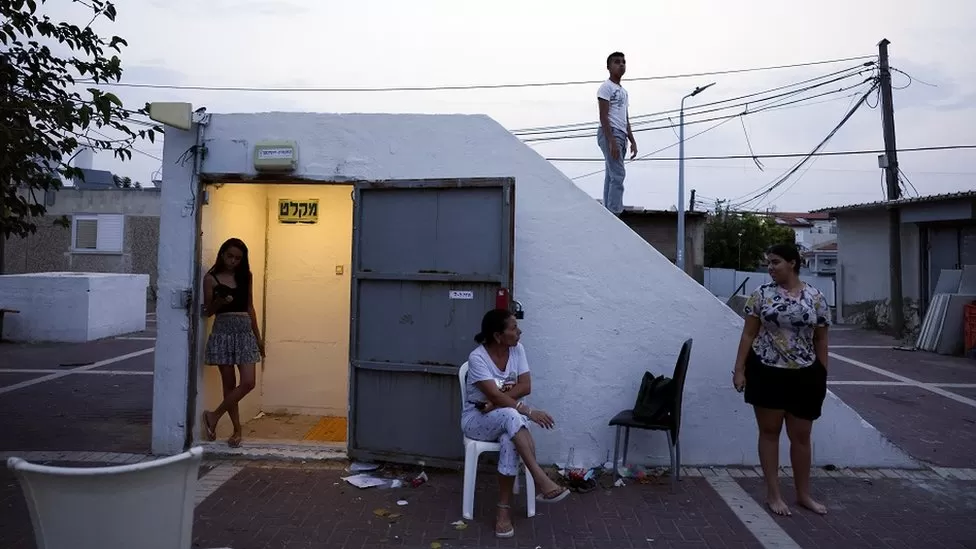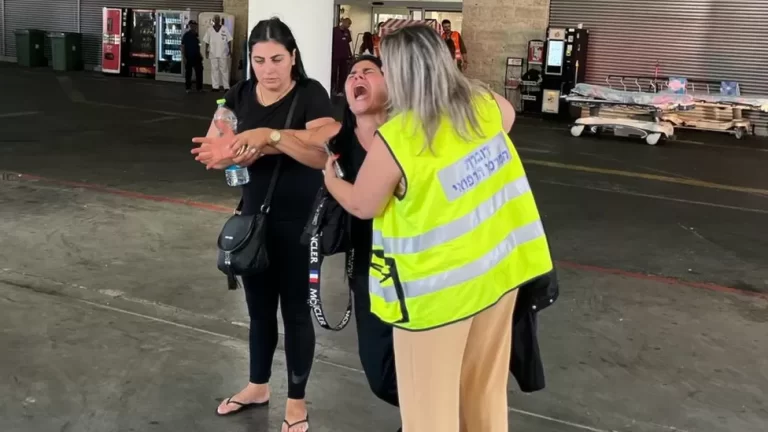Sunday should have been the start of the working week and the return to school in the southern Israeli city of Ashkelon, with the end of the Jewish high holidays.
Instead, the streets were virtually empty.
Just a day ago, some of the hundreds of Palestinian gunmen who from Gaza were at large here and shocking events have continued to unfold nearby. Social media video shows Israeli forces pursuing militants who had stolen a car. They were killed in a dramatic shootout on the roadside.
The only small crowds we encounter are by the Barzilai Medical Center. Weary medics stand by the entrance to the emergency ward. They have treated more than 400 patients because of the surprise attack by Hamas, the militant group which governs Gaza.
“It was very difficult, a lot of casualties have been brought one after one, one after one very quickly,” says the hospital's general director, Prof Hezi Levy. “I am very experienced, but I haven't seen in my life such a scenario.”
One 30-year-old man having a cigarette looks badly shaken. He tells me he is a medical worker from Tel Aviv but is here as a patient after joining an overnight dance party in the fields near Gaza which ended catastrophically on Saturday morning. He asks that I do not use his name.
He has been shot in the hand, losing a finger, and has wounds on his head.
“In the morning, the rocket fire started. Everyone got scared and started running towards the road to drive home. As we got on the road, the gunfire began. It was really shocking. People were murdered, there were car accidents,” the man says.
“I called the police. Nobody could help us. For an hour and a half, we sat inside a battle, helpless. Eventually I got into the car with some people. I'm a medic so I tried to evacuate two wounded. As I reached a junction I saw people in army fatigues – but they weren't military – they started firing at me.”
Many Israelis I meet are shocked at how their powerful security forces were overwhelmed by the scale and complexity of the Hamas operation. Now there are complaints of a lack of help from the authorities.

One tearful couple are making their own inquiries going from hospital to hospital. They do not know if their missing son is injured, dead or among the dozens of hostages who have been snatched by armed fighters and taken back to Gaza.
A distraught mother, Rachel Ezra confronts an MP who is visiting the hospital. “I want you to help me find my boy, Oz and his girlfriend Naomi – they're aged 24 and 23,” she shouts. “I don't know what to say!”
She calls for the toughest military action against Gaza in retaliation for what has happened, and she is not the only one.
An Israeli volunteer – who does not want to give his name – rushed here from his home – a three-hour drive away in northern Israel, to help the medical staff. He says he has been caring for many of the wounded soldiers – amid “horrible” bloodshed – and like him they want to see Hamas hit hard.
“I spoke to the soldiers also and they're very disappointed. They want us to react way stronger and to be less politically correct when it comes to our way of warfare,” he says, adding that he believes foreign diplomats contain Israel's response.
Meanwhile, the Israeli military insists it is carrying out a decisive campaign in the Gaza Strip just a short distance away.
“The days ahead will be long and difficult,” its chief spokesman, Rear Adm Daniel Hagari has said. “We have paid a heavy price but we will restore security to the people of Israel.”
Overhead, there are regular booms as Israel's Iron Dome missile defence system intercepts rockets which have been fired by Palestinian militants. It has protected residents through many previous rounds of fighting with Hamas. But right now, nobody in Ashkelon feels very safe.
— CutC by bbc.com


